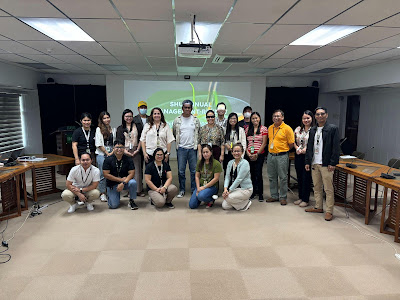Tokyo, Japan (March 17-19, 2025) – As greenhouse gas (GHG) emissions drive climate change, which in turn threatens agricultural productivity, the need for timely intervention has become more urgent—especially in regions where rice is a primary source of nutrition.. Key actors came together at the ASEAN-Japan Workshop on Carbon Neutrality, Food Security, and Agricultural Innovation aimed to share strategies for carbon neutrality in agriculture, promote collaboration between ASEAN Member States (AMS) and Japanese companies to co-develop climate-smart solutions and enhance agricultural competitiveness in the ASEAN region through low-carbon practices and technologies.
Friday, April 4, 2025
Scaling readiness of improved nutrient management in rice through farmer clusters
“Start with the end in mind.” This idea guided the Workshop on Innovation Package and Scaling Readiness (IPSR) for the cluster-based recommendations of Rice Crop Manager Advisory Service (RCMAS). The workshop was held on March 11, 2025, in Cagayan de Oro. As part of the session, participants agreed on an end goal: “By 2028, DA Region 10, along with ATI-RTC 10, local government units (LGUs), NIA, and other partners, aims to reach 80% of rice clusters and get 40% of rice farmers to adopt the cluster-based RCMAS recommendations. This initiative will improve farming practices, boost productivity, and support the sustainability of the rice industry.”
Thursday, April 3, 2025
ORYZA in action: A comprehensive training on rice growth and climate impact modeling
The Advanced Modeling for Environment, Emission, Exchange, and Extension (AM4E) – ORYZA modeling team successfully conducted a comprehensive training on the Practical Applications of ORYZA in Rice Research from March 24 to 28 at the IRRI Network Commons, Philippines.
Friday, March 21, 2025
IRRI’s Plant Pathology and Host Plant Resistance Group holds open house to mark 65 years of milestones
Marking its 65th year, the International Rice Research Institute’s (IRRI) Plant Pathology and Host Plant Resistance group, led by Dr. Van Schepler-Luu, hosted an open house to showcase their facilities and share the impact of their research in protecting rice from devastating diseases.
Wednesday, March 12, 2025
SHU Strengthens Commitment as a Research Partner in 2025
LOS BAÑOS, LAGUNA, 14 February 2025 – IRRI’s Seed Health and Logistics Unit (SHU), IRRI’s arm that facilitates the safe, efficient, and timely exchange of biological materials for research and development, commits to further strengthen collaboration, improve service efficiency, and expand its reach to better support partners and stakeholders. During its Annual Management Meeting, SHU reaffirmed its commitment to aligning with the strategic goals of IRRI and RBI and the CGIAR 2025-2030 portfolio, and to ensure innovative solutions and high-quality services that support agricultural research and the smooth movement of biological materials.
Wednesday, March 5, 2025
Water Management Challenges study findings were presented at the 10th ICWFM Conference 2025
Dhaka, Bangladesh – The International Rice Research Institute (IRRI) and the Institute of Development Studies and Sustainability (IDSS) at United International University (UIU) shared their findings at the International Conference on Water and Flood Management (ICWFM) 2025. This conference, which focused on conserving water and ecosystems for climate resilience, happened from February 22-24 at the Centre on Integrated Rural Development for Asia and the Pacific (CIRDAP) in Dhaka.
Monday, March 3, 2025
Major study reveals widespread adoption of CGIAR agricultural innovations in Vietnam, Impacting millions of rural households
A comprehensive study documenting the extensive adoption of CGIAR-supported agricultural innovations across Vietnam was presented at a high-level workshop in Hanoi. The study has identified notable breakthroughs achieved under the initiative, including improved rice and cassava varieties and the successful integration of new tilapia strains.







